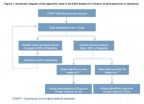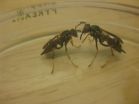(Press-News.org) Many people suffer from chronic inflammation because their immune systems overreact to 'self' tissue. Sydney scientists believe that a small molecule known as Interleukin 21 is a promising therapeutic target in such cases.
Interleukin 21 (IL-21) is one of a group of chemical messengers known as 'cytokines', which affect the behaviour of immune cells. IL-21 is already well known to play an important role in autoimmune diseases such as Sjögren's syndrome and type 1 diabetes.
The current study shows how much IL-21 contributes to inflammation. It also shows how important it is to remove IL-21 to reduce inflammation, even where there are other severe immune defects present.
Undertaken at Sydney's Garvan Institute of Medical Research, researchers used mice genetically deficient in another cytokine (IL-2), a well-established mouse model of autoimmunity. In some mice, the IL-21 cell surface receptor was also genetically removed. In these mice, inflammatory disease was much less severe, demonstrating that IL-21 contributes to fatal inflammatory disease.
Immunologists Associate Professor Cecile King and Dr Alexis Vogelzang, in collaboration with bioinformatics experts Drs Marcel Dinger and Brian Gloss, combined cellular analysis and RNA sequencing to compare genes expressed in the disease model with those expressed in healthy immune cells. The study confirmed that IL-21 is one of the most highly expressed genes in autoimmune disease.
The findings are published in the Journal of Immunology, now online.
"RNA sequencing is an unbiased way of determining differential expression of genes, and this data revealed the proinflammatory gene signature of autoimmune disease and confirmed the extent to which IL-21 is elevated in the absence of IL-2," said Associate Professor King.
"When you remove the IL-2 gene, another group of very calming immune cells known as 'T regulatory cells' also disappear – because T regulatory cells express high levels of the IL-2 receptor and are IL-2 dependent. Without T regulatory cells, the immune system goes haywire and the body starts attacking itself."
"Under these conditions, IL-21 kicks in and make things much worse."
"When IL-21 is blocked, the huge inflammatory response is greatly subdued, although not entirely eliminated."
"There are many people with chronic inflammation caused by defective T cell regulation, and this research suggests that blocking IL-21 with drugs might help them."
INFORMATION: END
Slowing down the immune system when in overdrive
2014-02-10
ELSE PRESS RELEASES FROM THIS DATE:
When you always gotta go…
2014-02-10
Problems related to urination, including incontinence and having to get up to urinate at night-time, have become more acceptable topics of discussion over recent years. New treatment options have also led doctors to address these symptoms more actively. Despite this, no study has effectively compared the bother of each of these bladder symptoms for men and women of all ages.
The FINNO Study is an ongoing questionnaire survey conducted right across Finland. A random sample of 6,000 adults identified from the Finnish Population Register, were contacted with a questionnaire ...
New trial results affirm better blood pressure management during C-section
2014-02-10
10 February 2014, Singapore: New trial results1 have shown that the world's first Double
Intravenous Vasopressor Automated (DIVA) System affords superior control of maternal blood pressure in women undergoing caesarean section under spinal anaesthesia, when compared with manually-administered medication to manage reduced blood pressure (vasopressor).
Developed by doctors at KK Women's and Children's Hospital (KKH), the novel DIVA System detects and responds rapidly to low blood pressure and/or slow heart rate in real time by auto-administering a precise amount of the ...
Normal enzyme aids a mutant 1 to fuel blood cancer's growth
2014-02-10
BOSTON (Feb. 10, 2014)—Reinforcing the need to look beyond genomic alterations to understand the complexity of cancer, researchers from Dana-Farber/Boston Children's Cancer and Blood Disorders Center report that a normal enzyme called SYK pairs with FLT3, the most commonly mutated enzyme found in acute myelogenous leukemia (AML), to promote progression of the disease. This molecular partnership also promotes AML cells' resistance to treatment with FLT3-blocking drugs, potentially explaining the relatively poor showing of FLT3 inhibitors in multiple clinical studies. In ...
Flat-pack lens boosts solar power
2014-02-10
Micro-machining could be used to create almost flat, Fresnel lenses, that boost the electrical efficiency of solar panels, according to researchers in China.
Fresnel lenses were invented by French engineer and scientist Augustin-Jean Fresnel, in the early nineteenth century, they are essential two-dimensional equivalents of conventional optical lens, but they have ridges in concentric rings that focus the light to a point behind the lens without the three-dimensional bulk of a conventional lens. Image quality is reduced when using a Fresnel lens to focus because the concentric ...
Study reveals unexpected cell hijack method in pancreatic cancer
2014-02-10
Pancreatic stellate cells, which normally aid tissue repair, unwittingly help pancreatic cancer grow and spread in a method of 'cell hijack' only seen before in brain and breast cancer, according to new research from Queen Mary University of London.
The research, published in the latest issue of EMBO Molecular Medicine and carried out by Queen Mary's Barts Cancer Institute, also revealed the process can be blocked, thereby preventing the growth and spread of the tumour.
The study, funded by the UK charity Pancreatic Cancer Research Fund, set out to investigate the messaging ...
EORTC characterizes responders & survivors on pazopanib for advanced soft tissue sarcoma
2014-02-10
An EORTC analysis appearing in Annals of Oncology confirmed the importance of known prognostic factors such as performance status and tumor grading for having a long-term outcome in patients treated with pazopanib for metastatic soft tissue sarcoma. Additionally, hemoglobin at baseline was found to be a new prognostic factor.
Soft tissue sarcomas are a heterogeneous and relatively rare tumor with an estimated incidence of four per 100,000 people per year in Europe. The prognosis for patients with this disease is favorable if they are diagnosed at an early stage and if ...
Massive neutrinos solve a cosmological conundrum
2014-02-10
Scientists have solved a major problem with the current standard model of cosmology identified by combining results from the Planck spacecraft and measurements of gravitational lensing in order to deduce the mass of ghostly sub-atomic particles called neutrinos.
The team, from the universities of Manchester and Nottingham, used observations of the Big Bang and the curvature of space-time to accurately measure the mass of these elementary particles for the first time.
The recent Planck spacecraft observations of the Cosmic Microwave Background (CMB) – the fading glow ...
Wasps use ancient aggression genes to create social groups
2014-02-10
Aggression-causing genes appeared early in animal evolution and have maintained their roles for millions of years and across many species, even though animal aggression today varies widely from territorial fighting to setting up social hierarchies, according to researchers from Iowa State University, Penn State and Grand Valley State University.
If these "mean genes" keep their roles in different animals and in different contexts, then perhaps model organisms -- such as bees and mice -- can provide insights into the biological basis of aggression in all animals, including ...
Dental care in school breaks down social inequalities
2014-02-10
A new survey conducted by the University of Copenhagen and the World Health Organization (WHO) is highlighting the role of schools in work to promote health and prevent disease.
"Children in Scandinavia generally have healthy teeth and gums, largely on account of dental care in schools for all children, the arrival of fluoride toothpaste on the market, a healthy lifestyle and high living standards. But the situation in the poorest countries of the world is very different to that in Scandinavia. However, it is positive to note that the WHO's Health Promoting Schools Initiative ...
Threatened eels disappear in the deep on their way to the Sargasso Sea
2014-02-10
When the threatened European eels cross the Atlantic Ocean to get to the Sargasso Sea to spawn, they swim in deep water. But this does not protect them from predators, researchers from the University of Southern Denmark report: Even in deep water the eels are hunted and eaten.
The European eel is in decline, and all over the world biologists are struggling to map its mysterious life cycle in order to bring its numbers back up. One of the great puzzles is why and how the eel each year travels thousands of kilometers to get to the Sargasso Sea to spawn.
A European monitoring ...



